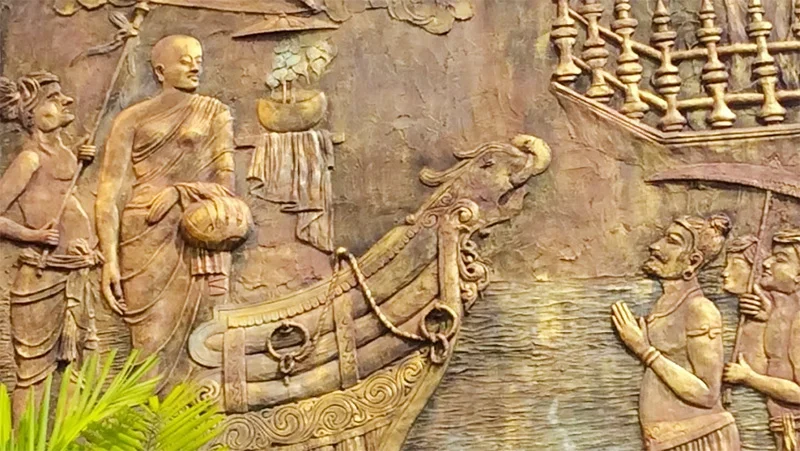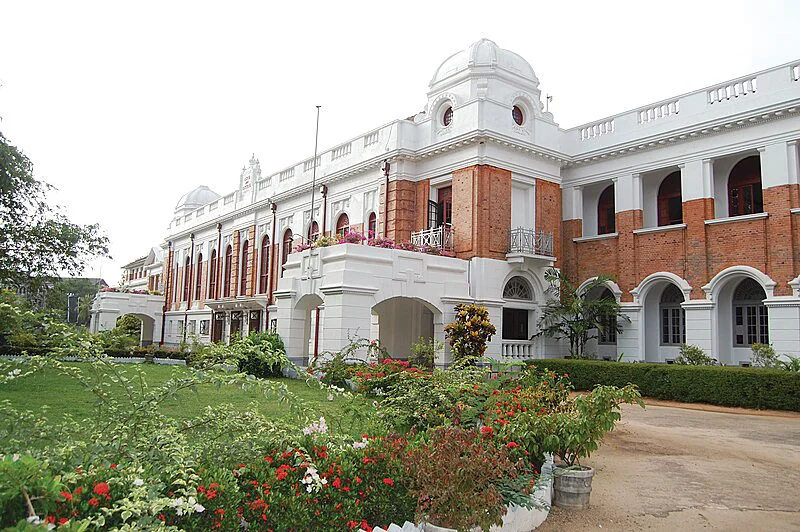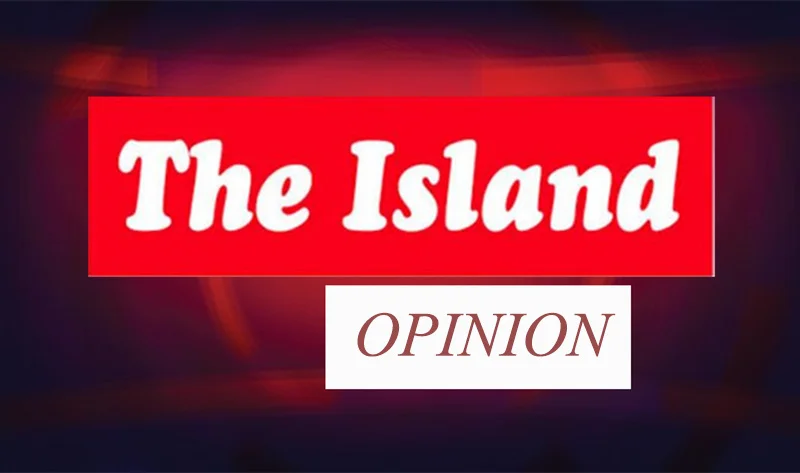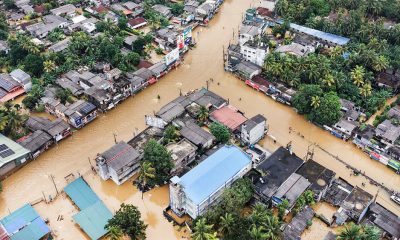Opinion
Candour without caution dangerous naivety

By ROHANA R. WASALA
It was recently reported in the media (e. g. The Island/Monday, July 19, 2021) that Public Security Minister Rear Admiral (Retd) Sarath Weerasekera had said that all young persons above the age of 18 years should be given military training to inculcate disciplinary values in them. He was speaking at the opening of a new police station at Hirana in Panadura, last week. The Minister, while referring to the prevalent opinion about the young generation (i.e., children and young adults in education generally, I presume) that they have no respect for discipline, obedience to rules, and good behavioural values, observed that the problem could be tackled with proper training. He immediately qualified what he said with: “This does not mean we must turn them into military personnel, but if we are to train the youth above 18 properly, the most suitable places for that training are military camps. We must design a course aimed at personality development.”
Rear Admiral (Retd) Sarath Weerasekera is very honest and trustworthy. I haven’t an iota of doubt about his sincerity and his commitment to the job he has been assigned with. But, anent this idea of his, I’d say in all humility: “Not so arbitrarily! Not so hastily!” However, as education is not his responsibility, the Public Security Minister may be making an implicit suggestion to his Cabinet colleague who is in charge of that subject. Isn’t it more urgent for the well-meaning Minister to look after the discipline of the minority of police officers who sometimes act in ways unbecoming of their profession, by getting the police hierarchy to enforce discipline on those few of their subordinates? He should not forget that there could still be blacklegs in the force, linked with yahapalanaya.
By the way, the Minister, quite sincerely and justly, showered the police with praise for rendering “yeoman service during the past few months in overcoming the threats posed by the underworld, and fighting the pandemic”, when, as The Island/July 26 reported, he called upon the Venerable Maha NayakeTheras of Asgiriya and Malwatta Chapters, and the Getambe Hamuduruwo, who, unlike the Maha Nayake monks, is known and respected for his blunt speech. The news item is illustrated with four telling pictures of the Minister meeting with the prelates and paying obeisance to them. To me it looks like The Island photographer has caught the Minister’s meetings with the monks in a satiric light.
The Buddhist Sangha has a key role to play (though it is always unobtrusive, based on the Dhamma) in fostering discipline among the people, including rulers and civil functionaries. Isn’t the motto of the Sri Lankan Police “Dhammo have rakkhati dhammacari” (The Dhamma protects the followers of the Dhamma)? But what is the heartbreaking reality the people encounter in this area today? Writer S.M. Sumanadasa’s opinion piece “Whither the Sangha and the Buddha Sasana?” (The Island/July 26) has well elaborated this deficit on the part of the Sangha. My own opinion is, as I have repeatedly pointed out, that only a united Maha Sangha can save the Buddha Sasana and the Buddhists; acting only as moral guides, without dabbling in politics, except when the survival of the Sasana and the people is in danger.
The Mahanayakes should be able to recall all the agitating young monks from the streets, ostracise those who don’t listen, put a stop to misrepresentations of Buddhism by misguided maverick monks, and counter the conspiracies of anti-Buddhist proselytisers, etc., and put politicians in their place, who so unashamedly exploit the yellow robe to cheat in their immoral political games. This is a tall order, no doubt, but the Maha Sangha must do the task or let the Buddha Sasana perish. There’s nothing to worry about the Buddha Dhamma/Buddhist teaching. It is better understood, practiced, and protected among the enlightened civilised people of the world everywhere. Theravada Buddhism has been absorbed (without a label, characteristically) into the basically humane religious philosophies and forms of democratic rule in the whole world. But the continuing absence of such an undivided Sangha leadership in Sri Lanka is spelling disaster for the Buddha Sasana and the Sinhala Buddhists.
It is true that the country’s successful tackling of the Covid-19 pandemic, through vaccination amidst untold difficulties and artificial snags, owes much to the hard work and the discipline of the health and security personnel, including the police. I measure success in this connection in the following terms: by now, over seven million Sri Lankans have got at least one dose of an anti-Covid vaccine, and over one million of them have got both. Vaccination is the only remedy available against the deadly disease. All 225 MPs and hundreds of local representatives must be equally responsible for saving the people, who elected them to office, from the Coronavirus. Their personal discipline must be exemplary, because they are also accountable if young people behave without discipline as alleged. I personally do not believe that the vast majority of our young people lack discipline.
But if it is perceived that there is such a problem, responsible politicians and educational authorities ought to do something about it, in an apolitical, non-controversial, scientific manner (i.e.,through ideological debate and discussion among experts, not leaving out agreeable youth interaction and involvement). They must take collective steps to democratically protect the young from falling into the hands of the negligibly few, ignorant and immature political power seekers among them, who have ruined the lives of generations of youth over the past roughly 55 years. The people have convincingly rejected them, and the same people will wholeheartedly support any positive measures that responsible people’s representatives and civil authorities introduce in good faith, by way of a remedy against their misleading quixotic adventures to ensnare the young into their schemes.
But if they admit their past errors, and conceptualise a new approach to national politics, as a bulwark against minority communalism as well as the big parties that succumb to the trickeries of the few racists among minority politicians, Sri Lanka will be theirs to rule. My frank view is that, Uvindu Wijeweera, the well-educated young son of the late Rohana Wijeweera, the founder ideologue and leader of the JVP, destroyed by the reactionary forces that his successors later befriended, has great potential in leading such a movement. Monks, please don’t wreck his chances. (This is an anticipatory digression, but not entirely out of context.)
Back to my present subject. My gut feeling, as a senior retired educator and educationist, is that the alleged problem and the solution suggested by the Public Security Minister (alleged youth indiscipline and military training, respectively), must be better conceptualised, more carefully thought out with the assistance of relevant non-self-seeking specialists, whose expertise is not in question, and whose love of the young and of the country is even more assured. (I don’t personally think that a problem of general youth indiscipline exists; if it does, adults must be held responsible, and their (adults’) problems, if any solved). I have worked with adolescents and young adults of both sexes in secondary and tertiary education in Sri Lanka and abroad for over 35 years (the better part of that time in an alien culture abroad). The wisdom that I have gained in connection with the subject at hand, is that normally young people everywhere are unspoilt and moral idealists. They are ready to act with self-discipline and responsibility or are ready to subject themselves to formal discipline, when they are convinced that discipline, contrary to what the word basically implies – restraint, control -, makes them strangely free and strong enough to channel the physical and mental energies that they naturally possess to create happiness for themselves and for those around them.
this more clearly when I taught abroad than when I was working in my own country Sri Lanka (where I worked for a shorter period in my less mature years). But, how disciplined our educated young people are in a conducive environment was demonstrated when they enthusiastically joined in a mass voluntary wall painting movement for town beautification across the country with the election of a new president in November 2019, that electrified them with new expectations and prospects of better times to come.
Incidentally, the Minister’s proposal reminds us of the leadership development programme that was introduced during the post-2009 government, and implemented with the help of for the benefit of fresh university entrants before the commencement of their academic studies. The Army was co-opted to the programme, because it had all the human and physical resources required for such an undertaking. It was probably partly intended as a dampener on the chronic problem of initiation ragging, which was historically and inevitably associated with the rejected and depleted political minority mentioned above. The programme was no doubt a wholesome confidence building and personality development measure, being a more rational and more acceptable form of initiation (than the sadistic ragging administered by psychopathic criminals) into independent university life from secondary school.
The programme was well received both by the students and their parents, and by the general public. However, the well-designed and well conducted initiative met with an adverse response, mostly for the wrong reasons, from foreign agenda promoting NGOs and blindly politicised oppositional groups. The proponents of the useful course of leadership training and personality development probably felt that, in the then prevailing context, this kind of reception was likely to later create public misunderstandings that could translate into electoral losses for the governing party. So it had to be abandoned almost as soon as it was started. A farcical personality development programme of the fake ‘Reconciliation’ brand was enacted under the yahapalanaya, when it was in its last legs.
The negative experience (being forced to abandon the first leadership programme for university entrants introduced during 2009-15) should have alerted the Minister to the possible, nay probable, repetition of criticism from the same quarters. Those attacks on the previous leadership development programme were for the most part unfounded, but not totally so. Their politicised nature betrayed a severe deficit of sincerity on the part of the critics. Employees of foreign NGOs, including even the (probably forcibly roped in) venerables of Friday Forum who disapproved of that military-like training, cannot free themselves from suspected susceptibility to the attraction of the filthy lucre. Their opposition can be safely disregarded if the recipient students, their parents and the general public have no problem with the rudimentary military training that the Public Security Minister proposes for all the young people of the country. But, in my opinion, the immediately existing political and social environment in Sri Lanka is not conducive for the success of such a personality development programme.
The Public Security Minister’s bona fides are beyond doubt. He pledged to stand by the police officers who carried out their duties in good faith. But he should know better than most if he has succeeded in emerging out of the lingering shadow of the yahapalana incubus. Candour without caution is likely to prove mere self-defeating naivety at the present juncture.
Opinion
Thoughts for Unduvap Poya

Unduvap Poya, which falls today, has great historical significance for Sri Lanka, as several important events occurred on that day but before looking into these, as the occasion demands, our first thought should be about impermanence. One of the cornerstones of Buddha’s teachings is impermanence and there is no better time to ponder over it than now, as the unfolding events of the unprecedented natural disaster exemplify it. Who would have imagined, even a few days ago, the scenes of total devastation we are witnessing now; vast swathes of the country under floodwaters due to torrential rain, multitudes of earth slips burying alive entire families with their hard-built properties and closing multiple trunk roads bringing the country to a virtual standstill. The best of human kindness is also amply demonstrated as many risk their own lives to help those in distress.
In the struggle of life, we are attached and accumulate many things, wanted and unwanted, including wealth overlooking the fact that all this could disappear in a flash, as happened to an unfortunate few during this calamitous time. Even the survivors, though they are happy that they survived, are left with anxiety, apprehension, and sorrow, all of which is due to attachment. We are attached to things because we fail to realise the importance of impermanence. If we do, we would be less attached and less affected. Realisation of the impermanent nature of everything is the first step towards ultimate detachment.
It was on a day like this that Arahant Bhikkhuni Sanghamitta arrived in Lanka Deepa bringing with her a sapling of the Sri Maha Bodhi tree under which Prince Siddhartha attained Enlightenment. She was sent by her father Emperor Ashoka, at the request of Arahant Mahinda who had arrived earlier and established Buddhism formally under the royal patronage of King Devanampiyatissa. With the very successful establishment of Bhikkhu Sasana, as there was a strong clamour for the establishment of Bhikkhuni Sasana as well, Arahant Mahinda requested his father to send his sister which was agreed to by Emperor Ashoka, though reluctantly as he would be losing two of his children. In fact, both served Lanka Deepa till their death, never returning to the country of their birth. Though Arahant Sanghamitta’s main mission was otherwise, her bringing a sapling of the Bo tree has left an indelible imprint in the annals of our history.
According to chronicles, King Devanampiyatissa planted the Bo sapling in Mahamevnawa Park in Anuradhapura in 288 BCE, which continues to thrive, making it the oldest living human planted tree in the world with a known planting date. It is a treasure that needs to be respected and protected at all costs. However, not so long ago it was nearly destroyed by the idiocy of worshippers who poured milk on the roots. Devotion clouding reality, they overlooked the fact that a tree needs water, not milk!
A monk developed a new practice of Bodhi Puja, which even today attracts droves of devotees and has become a ritual. This would have been the last thing the Buddha wanted! He expressed gratitude by gazing at the tree, which gave him shelter during the most crucial of times, for a week but did not want his followers to go around worshipping similar trees growing all over. Instead of following the path the Buddha laid for us, we seem keen on inventing new rituals to indulge in!
Arahant Sanghamitta achieved her prime objective by establishing the Bhikkhuni Sasana which thrived for nearly 1200 years till it fell into decline with the fall of the Anuradhapura kingdom. Unfortunately, during the Polonnaruwa period that followed the influence of Hinduism over Buddhism increased and some of the Buddhist values like equality of sexes and anti-casteism were lost. Subsequently, even the Bhikkhu Sasana went into decline. Higher ordination for Bhikkhus was re-established in 1753 CE with the visit of Upali Maha Thera from Siam which formed the basis of Siam Maha Nikaya. Upali Maha Thero is also credited with reorganising Kandy Esala Perahera to be the annual Procession of the Temple of Tooth, which was previously centred around the worship of deities, by getting a royal decree: “Henceforth Gods and men are to follow the Buddha”
In 1764 CE, Siyam Nikaya imposed a ‘Govigama and Radala’ exclusivity, disregarding a fundamental tenet of the Buddha, apparently in response to an order from the King! Fortunately, Buddhism was saved from the idiocy of Siyam Nikaya by the formation of Amarapura Nikaya in 1800 CE and Ramanna Nikaya in 1864 CE, higher ordination for both obtained from Burma. None of these Niakya’s showed any interest in the re-establishment of Bhikkhuni Sasana which was left to a band of interested and determined ladies.
My thoughts and admiration, on the day Bhikkhuni Sasana was originally established, go to these pioneers whose determination knew no bounds. They overcame enormous difficulties and obtained higher ordination from South Korea initially. Fortunately, Ven. Inamaluwe Sri Sumangala Thero, Maha Nayaka of Rangiri Dambulla Chapter of Siyam Maha Nikaya started offering higher ordination to Bhikkhunis in 1998 but state recognition became a sore point. When Venerable Welimada Dhammadinna Bhikkhuni was denied official recognition as a Bhikkhuni on her national identity card she filed action, with the support of Ven. Inamaluwe Sri Sumangala Thero. In a landmark majority judgement delivered on 16 June, the Supreme Court ruled that the fundamental rights of Ven. Dhammadinna were breached and also Bhikkhuni Sasana was re-established in Sri Lanka. As this judgement did not receive wide publicity, I wrote a piece titled “Buddhism, Bhikkhus and Bhikkhunis” (The Island, 10 July 2025) and my wish for this Unduvap Poya is what I stated therein:
“The landmark legal battle won by Bhikkhunis is a victory for common sense more than anything else. I hope it will help Bhikkhuni Sasana flourish in Sri Lanka. The number of devotees inviting Bhikkhunis to religious functions is increasing. May Bhikkhunis receive the recognition they richly deserve.” May there be a rapid return to normalcy from the current tragic situation.”
by Dr Upul Wijayawardhana
Opinion
Royal Over Eighties

The gathering was actually of ‘Over Seventies’ but those of my generation present were mostly of the late eighties.
Even of them I shall mention only those whom I know at least by name. But, first, to those few of my years and older with whom speech was possible.
First among them, in more sense than one, was Nihal Seneviratne, at ninety-one probably the oldest present. There is no truth to the story that his state of crisp well-being is attributable to the consumption of gul-bunis in his school days. It is traceable rather to a life well lived. His practice of regular walks around the house and along the lane on which he lives may have contributed to his erect posture. As also to the total absence of a walking stick, a helper, or any other form of assistance as he walked into the Janaki hotel where this gathering took place.
Referencing the published accounts of his several decades-long service in Parliament as head of its administration, it would be moot to recall that his close friend and fellow lawyer, J E D Gooneratne, teased him in the following terms: “You will be a bloody clerk all your life”. He did join service as Second Assistant to the Clerk to the House and moved up, but the Clerk became the Secretary General. Regardless of such matters of nomenclature, it could be said that Nihal Seneviratne ran the show.
Others present included Dr. Ranjith de Silva, Surgeon, who was our cricket Captain and, to the best of my knowledge, has the distinction of never engaging in private practice.
The range of Dr. K L (Lochana) Gunaratne’s interests and his accomplishments within each are indeed remarkable. I would think that somebody who’d received his initial training at the AA School of Architecture in London would continue to have architecture as the foundation of his likes /dislikes. Such would also provide a road map to other pursuits whether immediately related to that field or not. That is evident in the leadership roles he has played in the National Academy of Sciences and the Institute of Town Planners among others. As I recall he has also addressed issues related to the Panadura Vadaya.
My memories of D L Seneviratne at school were associated with tennis. As happens, D L had launched his gift for writing over three decades ago with a history of tennis in Sri Lanka (1991). That is a game with which my acquaintance is limited to sending a couple of serves past his ear (not ‘tossing the ball across’ as he asked me to) while Jothilingam, long much missed, waited for his team mates to come for practices. It is a game at which my father spent much time both at the Railway sports club and at our home-town club. (By some kind of chance, I recovered just a week ago the ‘Fred de Saram Challenge Cup’ which, on his winning the Singles for the third time, Koo de Saram came over to the Kandana Club to hand over to him for keeps. They played an exhibition match which father won). D L would know whether or not, as I have heard, in an exhibition match in Colombo, Koo defeated Frank Sedgman, who was on his triumphant return home to Oz after he had won the Wimbledon tournament in London.
I had no idea that D L has written any books till my son brought home the one on the early history of Royal under Marsh and Boake, (both long-bearded young men in their twenties).
It includes a rich assortment of photographs of great value to those who are interested in the history of the Anglican segment of Christian missionary activity here in the context of its contribution to secondary school education. Among them is one of the school as it appeared on moving to Thurstan road from Mutwal. It has been extracted from the History of Royal, 1931, done by students (among whom a relative, Palitha Weeraman, had played a significant role).
As D L shows, (in contra-distinction to the Catholic schools) the CMS had engaged in a largely secular practice. Royal remained so through our time – when one could walk into the examination room and answer questions framed to test one’s knowledge of Christianity, Buddhism, Hinduism and Islam; a knowledge derived mostly from the lectures delivered by an Old Boy at general assembly on Friday plus readings from the Dhammapada, the Bhagavad Gita, the St. John’s version of the Bible or the Koran recited by a student at senior assembly on Tuesday / Thursday.
D L’s history of Royal College had followed in 2006.
His writing is so rich in detail, so precise in formulation, that I would consider this brief note a simple prompt towards a publisher bringing out new editions at different levels of cost.
It was also a pleasure to meet Senaka Amarasinghe, as yet flaunting his Emperor profile, and among the principal organisers of this event.
The encounter with I S de Silva, distinguished attorney, who was on Galle road close to Janaki lane, where I lived then was indeed welcome. As was that with Upali Mendis, who carried out cataract surgery on my mother oh so long ago when he was head of the Eye Hospital. His older brother, L P, was probably the most gifted student in chemistry in our time.
Most serendipitous perhaps was meeting a son of one of our most popular teachers from the 1950s, – Connor Rajaratnam. His cons were a caution.
by Gamini Seneviratne
Opinion
“Regulatory Impact Assessment – Not a bureaucratic formality but essentially an advocacy tool for smarter governance”: A response

Having meticulously read and re-read the above article published in the opinion page of The Island on the 27 Nov, I hasten to make a critical review on the far-reaching proposal made by the co-authors, namely Professor Theekshana Suraweera, Chairman of the Sri Lanka Standards Institution and Dr. Prabath.C.Abeysiriwardana, Director of Ministry of Science and Technology
The aforesaid article provides a timely and compelling critique of Sri Lanka’s long-standing gaps in evidence-based policymaking and argues persuasively for the institutional adoption of Regulatory Impact Assessment (RIA). In a context where policy missteps have led to severe economic and social consequences, the article functions as an essential wake-up call—highlighting RIA not as a bureaucratic formality but as a foundational tool for smarter governance.
One of the article’s strongest contributions is its clear explanation of how regulatory processes currently function in Sri Lanka: legislation is drafted with narrow legal scrutiny focused mainly on constitutional compliance, with little or no structured assessment of economic, social, cultural, or environmental impacts. The author strengthens this argument with well-chosen examples—the sudden ban on chemical fertilizer imports and the consequences of the 1956 Official Language Act—demonstrating how untested regulation can have far-reaching negative outcomes. These cases effectively illustrate the dangers of ad hoc policymaking and underscore the need for a formal review mechanism.
The article also succeeds in demystifying RIA by outlining its core steps—problem definition, option analysis, impact assessment, stakeholder consultation, and post-implementation review. This breakdown makes it clear that RIA is not merely a Western ideal but a practical, structured, and replicable process that could greatly improve policymaking in Sri Lanka. The references to international best practices (such as the role of OIRA in the United States) lend credibility and global context, showing that RIA is not experimental but an established standard in advanced governance systems.
However, the article could have further strengthened its critique by addressing the political economy of reform: the structural incentives, institutional resistance, and political culture that have historically obstructed such tools in Sri Lanka. While the challenges of data availability, quantification, and political pressure are briefly mentioned, a deeper analysis of why evidence-based policymaking has not taken root—and how to overcome these systemic barriers—would have offered greater practical value.
Another potential enhancement would be the inclusion of local micro-level examples where smaller-scale regulations backfired due to insufficient appraisal. This would help illustrate that the problem is not limited to headline-making policy failures but affects governance at every level.
Despite these minor limitations, the article is highly effective as an advocacy piece. It makes a strong case that RIA could transform Sri Lanka’s regulatory landscape by institutionalizing foresight, transparency, and accountability. Its emphasis on aligning RIA with ongoing national initiatives—particularly the strengthening of the National Quality Infrastructure—demonstrates both pragmatism and strategic vision.
At a time, when Chairmen of statutory bodies appointed by the NPP government play a passive voice, the candid opinion expressed by the CEO of SLSI on the necessity of a Regulatory Impact Assessment is an important and insightful contribution. It highlights a critical missing link in Sri Lanka’s policy environment and provides a clear call to action. If widely circulated and taken seriously by policymakers, academics, and civil society, it could indeed become the eye-opener needed to push Sri Lanka toward more rational, responsible, and future-ready governance.
J. A. A. S. Ranasinghe,
Productivity Specialty and Management Consultant
(rathula49@gmail.com)
-
News5 days ago
Lunuwila tragedy not caused by those videoing Bell 212: SLAF
-

 News4 days ago
News4 days agoLevel III landslide early warning continue to be in force in the districts of Kandy, Kegalle, Kurunegala and Matale
-

 Latest News6 days ago
Latest News6 days agoLevel III landslide early warnings issued to the districts of Badulla, Kandy, Kegalle, Kurunegala, Matale and Nuwara-Eliya
-

 Features6 days ago
Features6 days agoDitwah: An unusual cyclone
-

 Latest News6 days ago
Latest News6 days agoUpdated Payment Instructions for Disaster Relief Contributions
-

 News2 days ago
News2 days agoCPC delegation meets JVP for talks on disaster response
-

 News2 days ago
News2 days agoA 6th Year Accolade: The Eternal Opulence of My Fair Lady
-

 Business2 days ago
Business2 days agoLOLC Finance Factoring powers business growth













